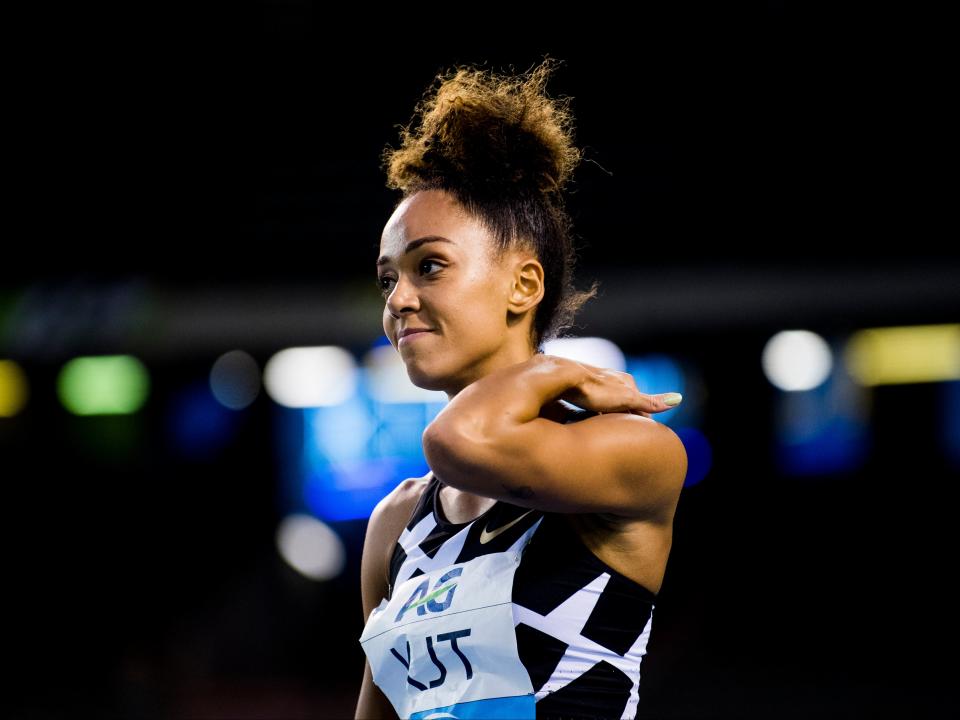Katarina Johnson-Thompson seeks fairytale ending at Tokyo Olympics after injury agony in pandemic
The heptathlon is one of the more peculiar events at the Olympics, even among the less traditional ones, where the swimmers try not to swim and the horses try not to act like horses.
The oddity lies in the challenge. The toil to put yourself through 100 metres hurdles, high jump, shot put, 200m, long jump, javelin throw and 800m across two days. Events that demand enough sacrifice on their own.
Heptathletes generally break down their work into parts: ticking over the stronger suits, tuning up the weaker ones. Season after season of ensuring all seven plates are in the air, ready to spin in unison when the Olympics comes around.
That’s how it was for Katarina Johnson-Thompson heading into last summer. A world indoor pentathlon and Commonwealth title in 2018 was followed by European indoor and World Championship golds in 2019, notching personal bests in five of the seven events that year. Such peaking off the back of a sixth-placing at Rio 2016 made glory a marked woman for Tokyo 2020.
That, though, was last summer. The delay has brought with it great challenge, enough to dash the Team GB star’s hopes of maintaining those high levels for another year. Covid-19 scuppered training and competition. Then, in December, a ruptured Achilles brought her back to square one, seven months out from these Games.
“I’m 100 per cent fit,” she said ahead of what will be her third Olympics. “It doesn’t mean I’m in PB shape. It just means I’m 100 per cent fit, training and ready to compete.
“I have trust in myself and my ability and making that step up for a heptathlon. But I’m so happy to just be here. It’s been so tough and I’ve been working every day. It’s been almost eight months to the day when I had my operation and I feel like I’m really happy I’ve got to the start line. It’s been super hard and been a victory to make it this far.”
If the usually bubbly KJT sounds downbeat, it’s worth pointing out that’s partly down to jet lag for this media engagement. But there is a deeper exasperation to her words.
Nine years ago, a kid who few knew about put everyone on alert with a bold showing at London 2012. Joining Jessica Ennis-Hill on her lap of honour around the London Stadium, there was a sense of master and sensei about the them.
Rio 2016’s sixth-placed finish meant the baton hadn’t entirely been handed over. However, a British record of 6,981 points at Doha suggested she had a firm grasp on most of it. Now, the 28-year-old must dig deep to realise a fairytale conclusion.

Promisingly, she exudes mental robustness that suggests she’s past excuses and feeling sorry for herself. Her game face is well and truly on.
“I’m at peace with that now,” she said of the injury and rehab, which involved weeks wearing a protective boot. “I don’t know when that happened, but I am.
“I’m happy that I was able to get given the space to do that and go through that process. I’m a different person now, a different athlete. Covid, the injury, cancellation of the Olympics – all these different things I just feel I’m at complete peace with myself. I’ve been through so much and this is another part of the story.”
Her step-up in preparation from her base in Montpellier – she moved to France in 2016 – has had to be concentrated in the month before she came out here. She took part in the long jump at the British Grand Prix in July, finishing eighth with a leap of 6.10m but, perhaps more importantly, going off her full 19 steps for the first time since the injury. A few weeks ago, she went through four events intensely, followed by an 800m run to see how the Achilles reacted.
“My body responded absolutely fine,” she said of the aftermath. “I can go ahead now in full confidence to know that heptathlon’s going to be fine and I’m able to push on.”
Peace of mind is always key, as is experience of coming into competition unsure if her body is as strong as it usually is. Her self-assessment at this juncture is rooted in realism: given what she’s been through, she feels as good as could be expected. By the time she begins her two-day programme on Wednesday, she aims to be free of worry.

“When I’m thinking about part of my body on the start line - am I going to be able to do this, am I going to be able to do that - that’s when you see a performance that’s safe.
“I’ve got confidence going into it that I’m able to just think about performance and not worry about my body.”
The last eight months has given Johnson-Thompson perspective – mainly that her third Olympics should not be taken for granted. The wide-eyed athlete of 2012 is no more, the 2016 iteration weighed down by expectation is more mature. After coping with setbacks, the KJT of 2021 is pleased to make it this far and
“Different experiences give you different outlooks on stuff. I’ve had to work so hard in the last eight months just to get to the start line, so I’m really grateful to be here. I’m really grateful for being able to do what I do for a living.
“Really grateful for being at my third Olympics – all things that you take for granted normally, I’m really taking it in now. Getting on the plane yesterday is something I took for granted in Rio. Coming onto the start line, putting on team GB kit. I’m really grateful for everything.”
There is actually an eighth component a heptathlete cannot work on, per se. That’s being a big-occasion player. Experience informs whether an athlete can rise to those moments when the lights are bright and the stage is vast. But it can be hard to gauge whether someone has grown or, simply, others have shrunk.
Johnson-Thompson knows she does not have the requisite credit in the bank to call herself a clutch performer. But she believes she has a knack of doing her talent justice when, like here, she has returned from challenging periods.
“I wouldn’t call myself a Championship performer: I know that I’ve not performed well in championships before. But where I’ve come from ahead of those Championships, I’ve performed really well for me. I think any heptathlete when they enter a heptathlon, things step up naturally. With the added occasion of an Olympics, hopefully that’s some more ‘oomph’ for me.”
Everyone at these Olympics has their own story of how the pandemic has affected them. For Johnson-Thompson, it has unequivocally been a hindrance.
And while she must believe good things can still come, she will need to do something she has never done before: string together seven impressive performances while piecing herself back together at the same time.
Read More
Olympics skateboarding schedule: When will Sky Brown perform?
Tokyo Olympics LIVE: GB cycling after Puerto Rico win hurdles gold
Laurel Hubbard: New Zealand transgender weightlifter in profile

 Yahoo News
Yahoo News 